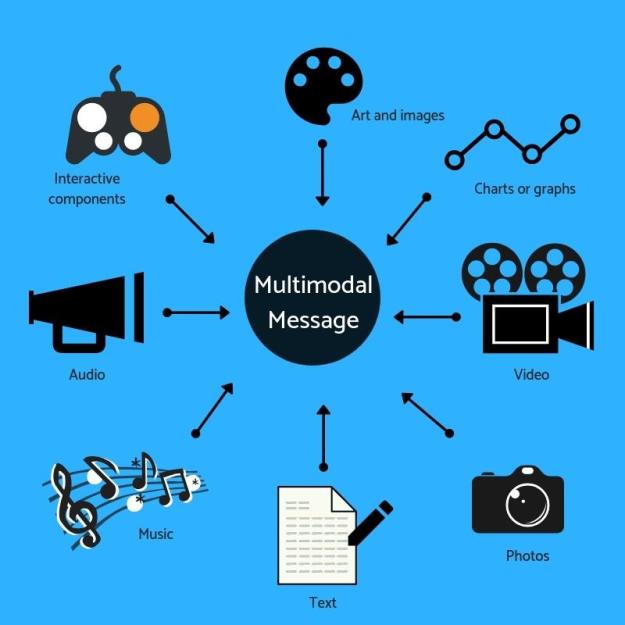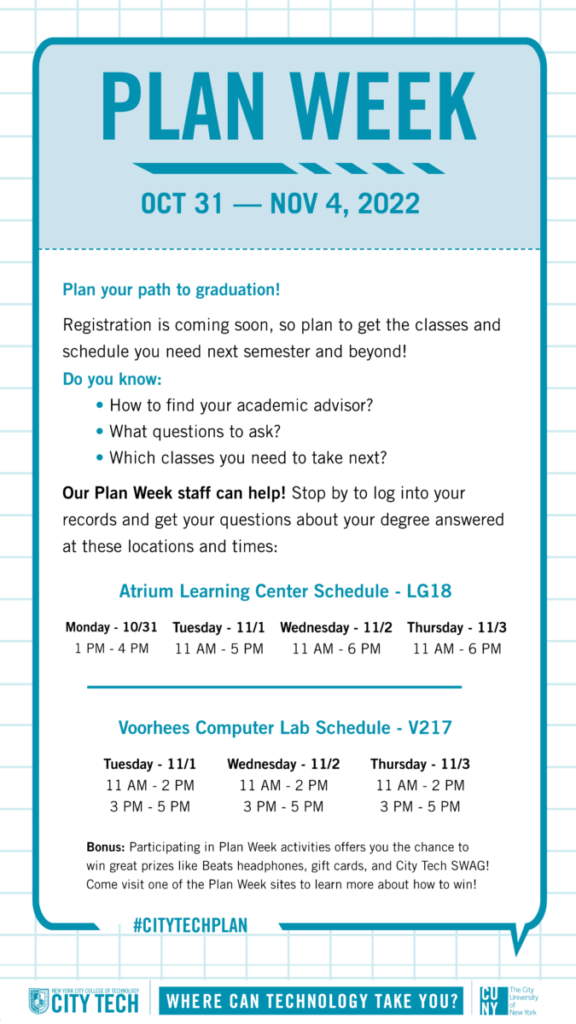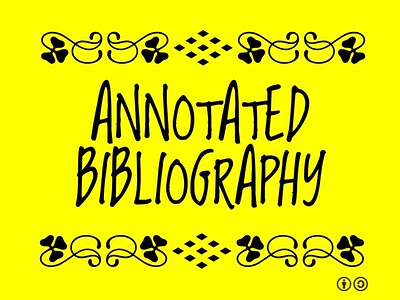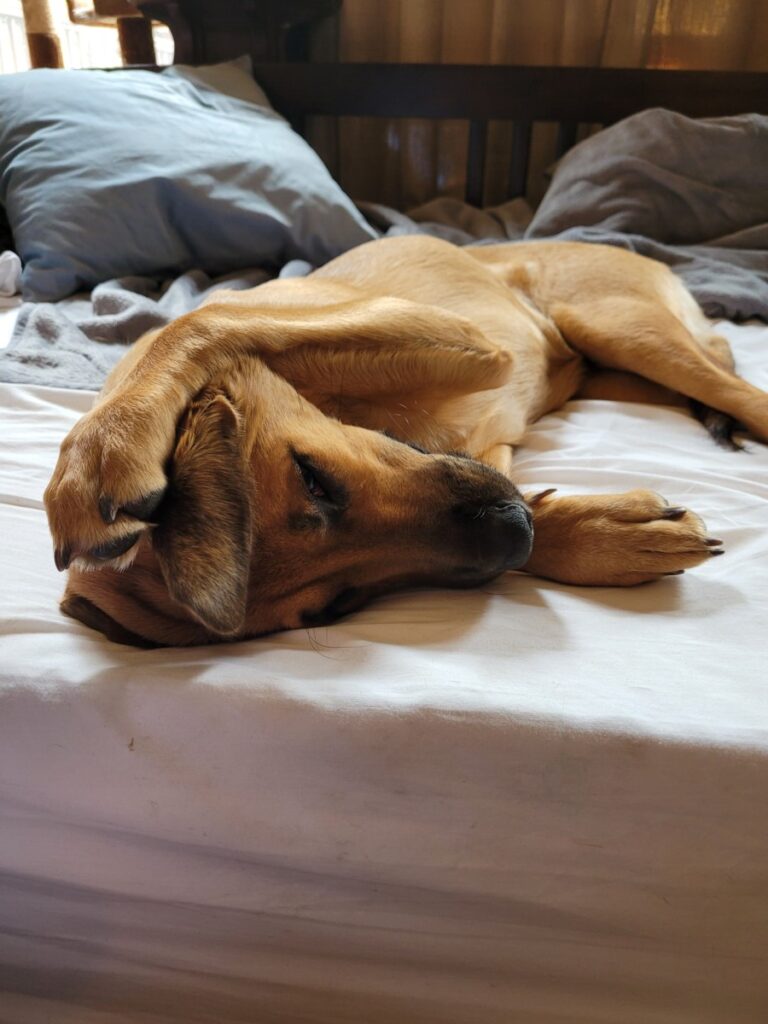Wednesday December 21
Quick update: I had to end Zoom a bit early, so if you want to get in touch, text me on Slack and we’ll find a time to meet if you’d like.
We’ve come to the end! I’ll be in the Zoom classroom today but you’re only required to attend if you have questions for me about the course. Final grades will be in the OpenLab Grade Book as soon as I look at the Final Portfolios, most of which I’ve already done. Official grades from CityTech are due Dec 27, so those will be available to you shortly after that.
If you’d like to leave a final message on the Padlet, feel free to do so. It’s not mandatory!
I hope everyone has a safe and peaceful holiday season. Best of luck next term with whatever you choose to do!
Monday December 19
This is our more or less final class meeting. We’ll get together briefly to answer any questions you still have about the Final Portfolio, but it’s due tomorrow night!
Again, I’ll be here on Wednesday in case anyone has any problems uploading to the Drive, but we’re pretty much done!
Here’s a new Padlet for leaving final thoughts and silly stuff!
Monday December 12
The class will meet but it will be dedicated to one-on-one conferences with me about the Final Portfolio. So if you have questions about what needs to be revised based on my Comments, or what needs to be in the Final Reflection, please join me. Specifics about what goes in the Final Reflection, as well as examples, are below in the December 7 Announcement.
There is NO class meeting on December 14 — it’s Reading Day, and there are no classes scheduled for CUNY that day.
Next week will also simply be one-on-one conferences. The last day is Wednesday, December 21.
The Final Portfolio (final revisions and the final reflection) is due Tuesday, December 20th by the end of the day. I can NOT accept late Final Portfolios! If you’re having difficulties, please let me know as soon as you can.
Wednesday December 7
Today, we’re looking at the rest of the Unit 3 projects. The ones we saw on Monday were awesome! Great work by Zoe, Luisomar, and Erick.
Remember: the project is due by the end of today, as well as the Artist’s Statement (which goes in its own folder in the Drive).
That also means Unit 3 is now closed, so the time to do the homework is over.
Today we start on the Final Portfolio. Go to that link to see what you’ll be doing. The short version is that the Final Portfolio contains revisions of Units 1 and 2, plus a longer Final Reflection where you look back on the term. Be sure to check out the requirements for the Final Reflection because they’re pretty specific.
In fact, once you do that, here’s a planning sheet to help you gather your thoughts for writing the Final Reflection:
And here are two examples of what a Final Reflection can look like:
Homework for Monday Dec 12:
Perusall: Read and annotate “Thinking about Revision.” You don’t have to do an OpenLab post for it, but leave comments as you go about what you might take a look at in your own work in terms of revisions
Monday December 5
We’re looking at Unit 3 projects today! It’s for celebrating… and tweaking.
I’ll also review the Artist’s Statement.
Wednesday, we start on the Final Portfolio as we head toward the end of the term.
Homework for Wednesday Dec 7
Google Drive: Be sure to upload your Unit 3 Project into the folder.
Google Drive: There’s a new folder for the Artist’s Statements, so upload or write yours here.
Wednesday Nov 30
My internet is fixed!! It’s been a problem all term, and now we’re good.
So we’re spending today giving feedback on rough drafts of your projects. I’ll also go over the Artist’s Statement a little more in depth, but the guidelines and examples are below in the Nov 28 post. We can also talk about how to post your projects in the Google Drive Unit 3 folder.
Homework for Monday Dec 5
Post your Unit 3 project in the Google Drive Unit 3 folder. Get it as close to finished as you can, but you have until Wednesday the 7th to finalize it. (The Artist’s Statement isn’t due until Wednesday, Dec 7.)
Monday Nov 28
I’m still without any internet connection, but that will be fixed by Wednesday’s class. We will have class today for a few minutes, mostly because the hotspot connection I’m using is a bit unstable and I don’t trust that it will stay connected very long or very often.
So today we’ll just check in and see where everybody is, answer questions, let the breakout room get together if they want.
I’m posting the Artist’s Statement guidelines below for you to take a look at (we’ll go over it quickly in class today and more thoroughly on Wednesday). There are also links to examples below.
Hope to see you all briefly today!
Here are links to a couple of Artist’s Statements:
- https://openlab.citytech.cuny.edu/fyw-pedagogy/artist-statement-1/
- https://openlab.citytech.cuny.edu/fyw-pedagogy/artist-statement-2/ (This was one of my students from FA 2021.)
Quick Announcement…
My wifi/internet has gone down. I’m on a mobile hotspot, which isn’t good. So you’re all free to go today. In other words — technology has reared its head and we’re having a day off totally unplanned.
I can still get texts on Slack, obviously, so let me know if you have problems.
Enjoy the break.
For Monday, just keep working on your Project for Unit 3. We’ll talk Monday about the Artist’s Statement and how to upload projects into the Unit 3 Google Drive folder.
Monday, Nov 21
Today, we’re going to keep talking about everybody’s project and partner people up based on genre (if you’d like).
To give you some help, I’m asking you all to do an analysis of your chosen genre. Remember the genre scavenger hunt we did early in the term about Street Art, Wedding Invitations, etc? We identified conventions and how individual examples followed or changed those conventions. We’ll start in the classroom if there are people in the same genre, and finish it up for homework. So…
Pick an example of the genre you’ve chosen, analyze it, and answer as many of these questions are you can?
- What tone/ type of language does this example use?
- How does this source use research? Do they quote from outside sources, use a lot of statistics, etc…
- What can you tell us about this source visually (and auditorily, if applicable)? Does it use a lot of imagery and color? Is the layout very clean? Is there a soundtrack?
- How long is it? (Words, pages, minutes)
- Who do you think is the audience of this source? What makes you think that?
- What aspects of this source would you like to emulate in your own writing? How might you do that?
- What aspects of this source would you like to avoid in your own writing? How will you do that?
If you’re doing this for Homework, you can…
- Write about what you found out in an OpenLab Post (category is project genre)
- Add it to the bottom of your Proposal page in the Google Drive Unit 3 folder.
And keep on working on your project!
Text me on Slack if you have questions.
Wednesday, Nov 16
You’re working on your projects! If you have questions, text me on Slack, and I’ll see if I can give you some help.
HW for next Monday:
Google Drive: Do your proposal for the Unit 3 project. I’ll leave you feedback and so will other people.
Google Drive: Read at least two proposals and leave comments for the author, either in the margins or at the end. “Sounds great!” is nice and encouraging, but also think about the kind of things that might be helpful to your classmate as they and you embark on this project. Here are some ideas:
- A specific publication or website you think the author could write for.
- A question or comment to help narrow down the audience: “You say you want young people to watch this video essay, but there’s no publication that all young people watch. Are you actually trying to reach New Yorkers?”
- A question or comment to help narrow down the genre: “There are a lot of different kinds of articles in the world. You could be writing for a newspaper like The New York Times or a website like Buzzfeed, and the writing is totally different for both. Can you be more specific?”
- You can also just talk about things in the proposal that you find especially cool or exciting.
Tuesday, Nov 15
Unit 2 grades are posted in the Grade Book. Let me know if you feel there are things I missed.
Monday, Nov 14 – Getting started with your project
First, there are some excellent and fun comments in Perusall about the Stedman article. Shout-outs to Zoe, Jonathan, and Erick — you three should go back and see my comments and talk to each other. Honestly!
This week, we’re nailing down our projects — what we want to get out into the world, who we think would benefit from hearing about it, what the best way is to get it to them.
- Topic — audience — genre
Today, we’ll play with the Padlet a bit. Brainstorm with anybody who wants to. And for Wednesday…
Google Drive: In the folder labeled Unit 3 – Writing in a New Genre, create a personal folder just like you did for Unit 2. Then write a 200-word proposal for your Unit 3 project (upload it here or simply write it here). It must include:
- A 1-2 sentence statement of what you want to teach your audience (the most important thing you learned in Unit 2)
- The audience you’re trying to reach
- The genre you’re planning to write it in and why you chose it
- A plan on how you intend to get started.
- Anything you might be worried about. What are your concerns about finishing this project?
I’ll give you some feedback on it as soon as I see what you’re up to.
Also on Wednesday, we’ll see if anybody is working in the same genres and let you set up as support groups (video, graphics/animation, podcast, comics, etc) — tech help, encouragement, honest feedback. Whatever you want to make of it. Feel free to group text on Slack, or even set up a Discord server.
Wednesday, Nov 9 – Starting Unit 3
For those of you who submitted drafts of Unit 2 – RAB, thank you. I’ll get notes back to you on the Google Drive asap.
For those of you who don’t submit a draft by the end of the day today, you get a 0 (zero) for the Unit 2 draft grade.
Also, homework for Unit 2 can no longer be made up after today.
Now for the good stuff!
We’re starting Unit 3 today, and you should enjoy this… if you’ve done Unit 2. You’ll be creating taking what you discovered in Unit 2, thinking about who you think might want to know about it or even benefit from it, and then figuring out the best way to get that information to them. In other words, audience!
Once you know who your target audience is, think about how they get information. Fourth graders sure don’t look at PowerPoints (nobody likes those things!), but you can talk about anything if you make a comic. High school and college students do Instagram, so why not creat an Instagram story or reel? I’ve even had a couple of students create a short interactive game!
It’s really up to you.
And here are some examples as well as suggestions and tips for creating your multimodal project (multimodal meaning using more than one mode, for example words + visuals, or spoken script + music).
When you’ve got your project more or less finished, you’ll be writing a reflection about it — what you went through, what went wrong, why you chose the genre you chose, what you would do if you had all the time in the world to do this… stuff like that. But that isn’t due until the end of the Unit.
This is a fun project that uses research in a very real way.
For next Monday, Nov 14:
Start thinking: about what you might want to do. You don’t have to finalize it until next Wednesday, but we’ll brainstorm in class on Monday. If you want to go ahead and post some ideas, here’s a Padlet for that (we’ll be doing this in class Monday, too).
Perusall: Read and annotate Stedman, “Annoying Ways People Use Research”
Open Lab: Just as a little spoiler, you should know that the things that annoy Kyle Stedman are not really particular to him. In general, these are things worth avoiding in your writing, though some conventions may vary, as Stedman himself points out, from genre to genre. Please write a two-part response after reading Stedman’s article:
- (approx 150 words) What did you learn from reading this? Anything new? What questions or comments do you have on how to use sources?
- (150-200 words) Write a paragraph for your intended audience for Unit 3 using one of your “key quotes” from Unit 2 in that paragraph. Keep Stedman’s guidelines in mind while writing this paragraph. Be kind to your audience! Try not to lose them by the side of the road (and don’t forget quote sandwiches!).
- Category: Stedman
For Wednesday, November 9
Be sure your draft of the Unit 2 – Reflective Annotated Bibliography is in the Drive. We’re starting on Unit 3 on Wednesday, and I’ll put the assignment materials up here at that time.
November 2 after class
HW for Monday: For Monday, put a draft of your RAB into the Google Drive folder. If you’d like me to look at it, or even at a small part of it, ahead of time, text me on Slack and I’ll get my comments back to you asap.
Here’s the example I made of how to create embedded quotes for your summary:
Here’s the link to the two RAB examples that on our Class Resources page.
October 31 after class
Here’s the link to the Colbert bit about Wheat Thins if you ever need it.
Also, on the Class Resources page, you’ll find information about quote sandwiches, summarizing, plagiarism, and paraphrasing. There’s also a link for you to download the Graf & Birkenstein templates/information about how to quote.
HW for Wednesday November 2
Google Drive: Add your second Source Analysis to your Unit 2 Reflective Annotated Bibliography document.
You must use one quote sandwich in your summary! Use Graff & Birkenstein to help you set it up: remember to introduce, explain and analyze your quote (OR QUOTES)!
Plan Week for Spring registration
Hi all. In case you didn’t get this in your CityTech email, here’s information about Plan Week which should help you get ready to register for the Spring Term.
October 26 after class
I hope everybody got a lot of good information about how to use our library today. That was truly one of the best librarian sessions I’ve had.
Here’s a log of the chat.
And here is the recording of the session. https://youtu.be/OKCDPuvnob0
HW for Monday October 31:
Perusall: Read and annotate “Using Quotes (Graf & Birkenstein).” You’ll see there’s a second assignment which you’ll be doing for your Source Analysis.
Google Drive: Add to your personal folder/doc inside the Unit 2 – Reflective Annotated Bibliography folder.
- Do your introduction paragraph.
- Make sure you have at least one source analysis done. Do the best you can with it. Look at the RAB examples below for help. It doesn’t have to be perfect because we’ll be working on it in class on Monday.
- One of your sources must be something you found in the CityTech Library. Please note that somewhere on your Google Doc. It does not have to be a peer-reviewed journal article.
RAB Examples
We’ve put together some examples of Unit 2 (as well as Unit 3) projects. They’re found on the Class Resources page, but here’s a quick link to the RAB examples. They include all phases of the RAB (Introduction, summary, source analyses, conclusion).
October 24 after class
Here’s the example of a Source Analysis (although, as I said, the quotes are separated from the summary, which is what we used to do, and you’ll need to put them in the summary itself).
And this is the presentation I was showing in class about doing a Source Analysis.
If you’d like the full presentation about doing the RAB, here it is. Again, it’s one we use for workshops through the Writing Center, so there are things on it that might not be useful for you.
HW for Wednesday October 26
Google Drive: Add your first Source Analysis to your personal folder in the Unit 2 – Reflective Annotated Bibliography folder. You should attach it to the bottom of the research question/introduction you’ve already done, either by copy/pasting it from somewhere else or simply by doing it in the Drive.
October 19 after class
Couple of things:
I mentioned today that if you want to book an appointment with me in the Writing Center, feel free. We can talk about anything you want to: https://openlab.citytech.cuny.edu/ctwritingcenter/
Here are the slides about the Source Analyses.
HW for Monday October 24
Google Drive: Be sure to upload/write your Introduction/Research Question in the Unit 2 folder. Create your own doc or your own folder, and put it there. Check the last assignment for more about what goes in there, in short it’s here’s what I’m looking into, here’s why it’s interesting to me, here’s where I might go look for some information (think interviews as well as the usual suspects), here are some of my who, what, when, where, why, how questions.
Perusall: Read and annotate Dirk, “Navigating Genres”
OpenLab: Write a blog post of at least 300 words answering the following questions:
- What are some genres that you feel you know well?
- How did you learn them?
- What are their common rhetorical features?
- What genres do you think might give you good information for Unit 2?
- What is it in particular about those genres that make them good potential sources for your topic?
- Category: Genres
Google Drive: Do a quick KWL+ for your idea/topic. Copy the template that’s in the drive, create your OWN Google Doc — don’t use the one that’s labeled TEMPLATE!
October 17 after class
I hope everybody got some insights during class today, about education and curiosity, and the need for us to go beyond what we’re taught are the rules.

Because for Unit 2, the RAB, it’s all about curiosity, trying to answer questions or learn more rather than staking out a position and defending it. You might end up with the same opinion about a topic that you had before you started, but you’ll know a whole more about it and be better prepared to talk about it with knowledge and insight.
So for homework… there’s the Padlet and the beginning of your RAB document in the Google Drive.
Padlet: If you didn’t do this in class, do it for homework. You can also revisit it even if you did do it in class, think about it, change your mind, or leave comments for each other.
Google Drive: Open the folder labeled Unit 2 – Reflective Annotated Bibliography. Then create a new folder and/or Google doc with your name on it. The first thing you’ll put in it is your research question — in fact, it will turn into the Introduction to your Reflective Annotated Bibliography!
You can do this on a Word doc and upload it, or you can create a new Google Doc and write it/paste it there.
Here’s what to write: Introduce your research question. You may find your topic anywhere– from Unit One to the Padlet ideas we wrote, to your peers’ Padlet posts! (It’s really okay if two people write about the same topic– I promise you).
What is important here– and I can’t stress this enough– is that you research something you want to know more about, not something you think you already know the answer to. You may be curious to know why there are so few African American ballerinas in major companies, or you may want to know how much “housing projects” have changed in New York since James Baldwin wrote “A Talk to Teachers” in 1963, or you may want to know what we really learn from playing computer games. Just be curious.
Write it in question form (it can’t be a yes-or-no question, though). You must cover all of the questions in bold:
- Why are you interested in this question? (Feel free to talk about your own personal experience with the topic, or to tell an anecdote about your experience with this subject matter)
- What do you expect to find in your research? (Why do you expect to find this?)
- What will you do if you find information that goes completely against what you had expected to find? (Will you throw it out? Will you write about it anyway? Will you challenge your own assumptions?)
- What kinds of who, what, when, where, why questions do you already have? We’ll do more with this in class, but it will help get some clarity even at this early stage.
Spend some time on this– because again this will serve as the first draft of the introduction for your annotated bibliography! That’s why you’re uploading it into the Google Drive folder.
October 12 after class
Well… that was interesting. Some great ideas and comments, both on Perusall and in the Google Docs. Thanks to those of you who really joined in.
Now… we take those comments and ideas, and we start to look at the process of research, and how that fits into this whole Google knowledge/understanding model.
HW for Monday Oct 17
Perusall: There are two pieces to read and annotate:
- Wierszewski, “Research Starts with a Thesis Statement” from Bad Ideas about Writing
- The Guardian, “Schools are Killing Curiosity”
OpenLab: In at least 300 words, address the following:
- What is something you were interested in when you were a kid? Are you still interested in that topic? How did asking questions help you learn more about that topic?
- If so, how has your curiosity changed and grown over the years? And what role did the educational system play in your curiosity (good or bad)?
- If you are not interested in this topic anymore, what do you think happened to that interest? Do you remember the specific time you LOST interest? What did you become interested in instead (and why?)
- CATEGORY: Curiosity
Oct 5 – grades
Hi. The Grades for Unit 1 are in the GradeBook. Remember: 1) you can’t make up Participation points, and 2) the grade for the draft can change when you turn in your final revisions except if you didn’t turn in a draft at all. As it says in the Syllabus:
- WARNING: You must turn in a draft of some kind the day it’s due for each unit; simply doing everything at the end of the term and submitting it in the Final Portfolio won’t work. No draft = 0 points as a Unit Grade, and that won’t change even if the draft you submit as part of the Final Portfolio is brilliant.
If you think I missed something, let me know.
October 3 after class
HW for WEDNESDAY OCT 12
Perusall: There are two things to read and annotate:
- Baldwin, “A Talk to Teachers”
- excerpt from Carillo
OpenLab: Write a post of at least 300 words that responds to the Baldwin and Carillo pieces you read and annotated on Perusall. In “A Talk to Teachers,” James Baldwin writes:
I would try to make [the student] know that just as American history is longer, larger, more various, more beautiful and more terrible than anything anyone has ever said about it, so is the world larger, more daring, more beautiful and more terrible, but principally larger – and that it belongs to him. I would teach him that he doesn’t have to be bound by the expediencies of any given administration, any given policy, any given morality; that he has the right and the necessity to examine everything.
Ellen Carillo makes the point that not everything is between the four corners of a text, and that we should go beyond Googlepedia to find information about our world. Your post should address these things:
- First of all, what do you think of what James Baldwin was saying? What do you think he means when he says “the world is larger?”
- Secondly, what do you think of Ellen Carillo’s argument that schools haven’t taught us correctly? What does she means by Google-knowing versus understanding?
- Third, are they saying the same thing? And what do you think you have the “necessity” to examine, or the obligation to “understand” rather than having only “Google knowledge”?
- To put it another way, what do you wish had been taught to you in school that wasn’t? Why do you want to know these topics?
- Category: Baldwin & Carillo
For your information…
Wed Oct 5
No class. CUNY is closed.
Mon Oct 10
No class. CUNY is closed.
Our next meeting is Wednesday October 12
Sept 28 after class
We talked about revision strategies, and here’s the information about how to do a Reverse Outline (including “The Trapper” that we looked at in class).
By the way, Anne Lamott’s “Shitty First Drafts” is in the Library section of Perusall.
Class tomorrow is optional because it’s a conversion day and people often have trouble getting here. I’ll be in the Zoom room if anybody wants to talk about their essay (I promise I’ll catch up in the next few days!!!).
HW for Monday Oct 3 (none for tomorrow Sept 29):
Open Lab: Write 150-200 words where you talk about writing this Language Narrative. What went well, what didn’t go so well. What you think you’re going to do to revise your work. Category: Unit 1 Reflection
Google Drive: Be sure your draft of the Unit 1 Language Narrative is posted in the folder. Also make sure you have the Reviewer’s Memo at the end so I can get an idea about what you’re doing and how you feel about the good and the worrisome aspects of it. Here’s the Reviewer’s Memo again:
- This is what I intended to do: Here’s why I wrote it. What I hoped it would do. What I want people to take away from the piece.
- This is what I think is going well.
- This is what I think I need help with.
Sept 21 after class
Please do keep leaving Comments for your classmates even though class is technically over. No grading for them, but it’s nice to see if other people are reading/liking/understanding what we’re doing.
HW for Wednesday Sept 28:
Google Drive: Upload a Less Sh*t^y First Draft of your Language Narrative into the folder labelled Unit 1 – Language Narrative.
Week 6 ( Sept 26 – 29 [yes, we meet Wed & Thu])
Mon Sept 26
No class. CUNY is closed!
Sept 19 after class
Here’s a link to the Anne Lamott piece, “Sh*t^y First Drafts.” And this is the YouTube from The Book Doctors.
HW for Wednesday Sept 21:
Google Drive: Upload your SFD of the Language Narrative into the Google Drive folder labelled “Unit 1 – Language Narrative.” Be sure to have at least 800 words (out of the final required 1000) so we’ll have something to work on. And don’t forget your Reviewer’s Memo of 100-200 words that you add to the bottom of your SFD!
- This is what I intended to do: Here’s why I wrote it. What I hoped it would do. What I want people to take away from the piece.
- This is what I think is going well.
- This is what I think I need help with.
Sept 14 after class
Great work! Some wonderful examples of the different genres. Very thoughtful.
I also have to acknowledge how great the annotation comments are on Perusall about the Storytelling article. If you haven’t looked at it yet, or even if you have, you should jump into one of the conversations. The more the merrier, as they say.
Here are a couple of links I showed in class:
- Paragraphing (PIE)
- The Hero’s Journey. A TEDTalk about how we’re all the heroes of our own journey. Several people mentioned something like this on Perusall, so I thought it would be nice to take a look. It’s short!
I also thought you might be interested in the questions I asked to help visualize a scene. So here they are: (tbd)
- Where are you in this scene?
- Who are you with? Can you describe them?
- What time of day is it? How do you know?
- What season is it? How do you know?
- What does your body feel like in this scene?
- What can you hear?
- What can you smell?
- What kinds of textures are around you?
- Where is the light coming from and what is it like?
- Look to your left in the scene. What do you see?
- Look to your right. What do you see?
- Look at your feet. What’s there?
- Look above you. What do you see there?
- Look behind you. Describe what you see.
Here’s the whiteboard from today where we came up with conventions for the language narrative genre:
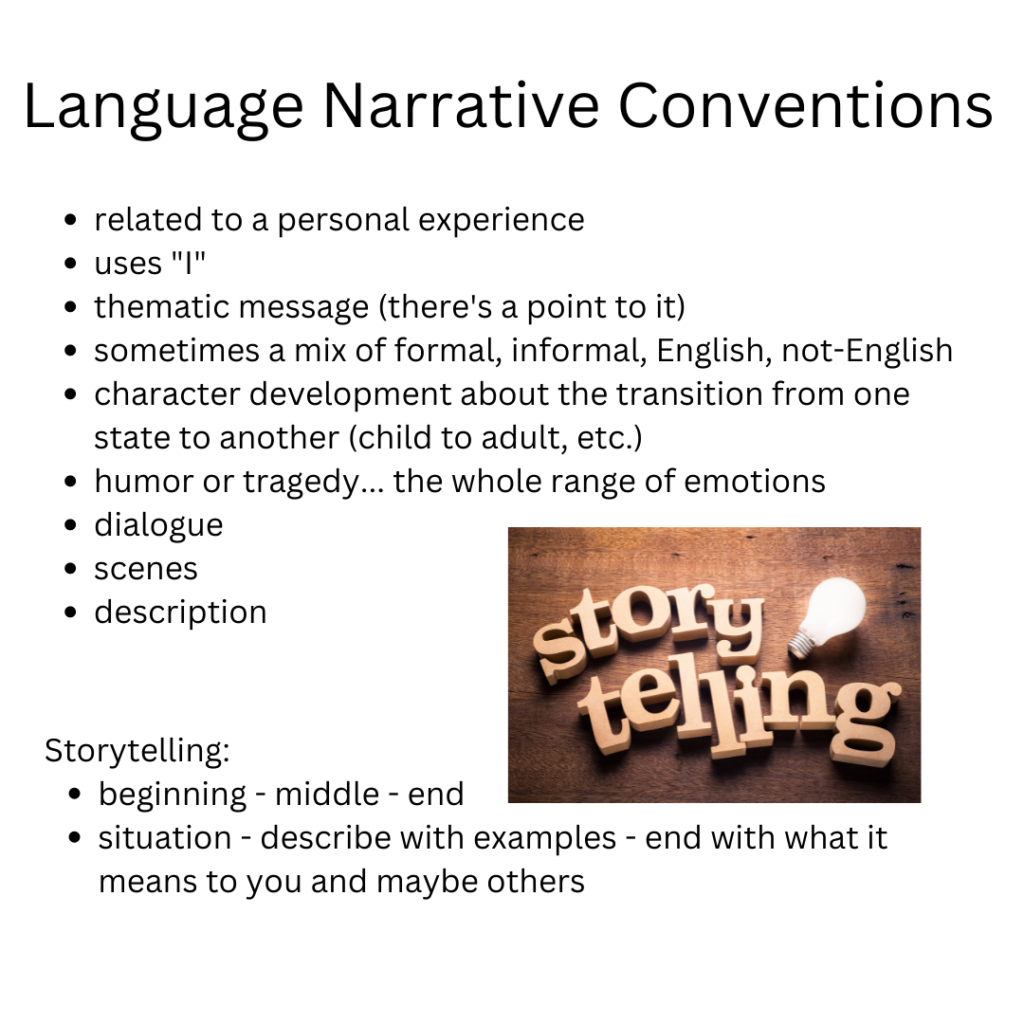
Last but not least —
HW for Monday Sept 19:
OpenLab: Write at least two distinct paragraphs (remember PIE!) describing one specific incident that influenced how you think about language using Concrete, Significant detail. It can be what you came up with in class or even something else that occurs to you. Category: Paragraphs
Sept 12 after class
Some great examples in the Scavenger Hunt! Take a look at them if you’d like — we’ll keep working on, and then talking about, them at the beginning of class Wednesday.
Meantime…
HW for Wednesday Sept 14:
Perusall: Read and annotate “Storytelling is not just entertainment.”
OpenLab: (250 Words) So far in this unit, we have read (and heard) several examples from the genre of the “language narrative.” Your first essay assignment in this class will be to write in this genre yourself. So in this discussion forum, I’d like us to have a conversation about what the features of this genre are. Please discuss some of the following:
- Thinking about the “Storytelling” article you just read, why do you think it’s important to share these stories?
- What, from what you’ve seen so far, are the “ingredients” (also known as “conventions”) of the language narrative genre? Use some examples from the videos and readings we’ve done.
- What do you think might be a place to get started with your own language narrative?
- What are your questions or concerns about writing a language narrative of your own?
- If you like, you can also feel free to share a language experience you had and ask for feedback from your colleagues (and me) to see if we think that might be a solid place to begin writing.
- CATEGORY: Conventions
Sept 7 after class
If I can just teach my dog some Zoom etiquette…
Thanks to all of you for putting up with Zoom and Ruby and and and…
I hope you had some good discussions in your Break Out rooms. I know you’ve all been through this for a couple of years, but it’s always a challenge starting a new class. So congrats for being patient and jumping in.
Don’t forget that you can to go to Perusall -> Library -> Unit 1 materials to find the Lysicott video and transcript, the Hasan video, and the Olivarez poem.
That said, here’s the homework (and here’s the Slack invitation again, and this is the Perusall code: BLAIN-X8FZE):
HW for Monday Sept 12
Perusall: There are two pieces about language that are great examples of a language narrative. Read and annotate:
- Amy Tan, “Mother Tongue”
- Jose Olivarez, “Maybe I Could Save Myself By Writing”
OpenLab: Create a blog post (at least 300 words) in which you write about your experience with various “Englishes.” In other words, how has your experience been similar to Lyiscott’s and/ or Hasan’s and/or Tan’s and/or Olivarez’ (Lysicott and Hasan are in the Perusall Library in the folder marked Unit 1 materials)? Please be specific and use at least one quote or paraphrase from one of the pieces in your response.
- Category: Englishes
Sept 7 (before class)
Quick heads up about Participation points. If you look on the Syllabus, you’ll see that you get 5-10 points for participation for each unit (Intro Activities are sort of their own unit). Those points are for coming to class, participating in whatever in-class activity we do in whatever way feels comfortable for you, and doing the homework assignments.
As it says in the Skills presentation, “scaffolding” means doing all the smaller assignments so you’ll be able to do the major ones more easily, or at least without as much confusion. That’s why they’re worth points… and why they I won’t count them once the unit is completed.
For example, the Intro Activities participation points included you doing each of these things:
- Doing the first Padlet
- Reading and annotating the Syllabus and the Lynda Barry comic on Perusall
- Writing an Introduction post on OpenLab
- Reading and annotating the Mike Bunn piece on Perusall
- Posting your response to the Mike Bunn piece on OpenLab
That means each thing is worth a point since there are a total of 5 Participation Points for the Intro activities. The scaffolding, fyi, is about getting up to speed on the tools as well as getting to know each other a little better AND thinking through what it means to write.
AND I won’t count them after Sept 12 (giving everybody a little extra time since there have been some issues).
I’ll post a list of the homework assignments at the beginning of each unit here on the Announcements page just to help you keep track.
If that’s not clear, ask me during class.
Much better.
Here’s the homework for next Wednesday (no class on Tuesday). I posted this on Slack as well. Let me know if you have problems.
Have a good Labor Day Weekend!
HW for Wednesday Sept 7
Catch up on the homework that was due on August 31.
OpenLab: Write an introductory post… but do it in the form of a message to your end-of-the-semester self. Talk a bit about who you are and what your goals are, your hopes for the year, maybe some pitfalls you feel you might be up against. You have to include some image or sounds in your post, something that you think will let us get to know you better. It can be something you have on hand, or that you draw, or find, or even link out to something else. Remember: This is the 21st century, so feel free to do whatever you think would be interesting for us to see/hear/learn about. Here’s the link to the Class Resources page which has a how-to video (and a downloadable handout to go with it) for how to create a Post.
- Category: Introductions
- CHECK BACK IN and see what other people are saying, and reply to a couple of people. It’s nice to know we’re not alone!
Perusall: Read and annotate Mike Bunn’s “How to Read Like a Writer.” Remember: you can write pretty much anything in your annotation – question why he wrote something a certain way, comment on whether you think it’s effective or not, respond to his questions. If someone has already highlighted a sentence, click on the highlight and add your own reply/comments. Start a conversation!
OpenLab: Since we don’t meet on Monday Sept 5, here’s a little extra assignment so you can practice creating posts on OpenLab. We’ll also use what you write in class on Sept 7:
- In his article, Mike Bunn writes, “You are already an author.” He’s talking to you. What do you think he means by this? What are some of the things you write already? (Hint: “nothing” is not an acceptable answer.) Think of all the ways you already use words in your everyday life. That’s authorship! How will that existing expertise help you in your college reading and writing career?
- Was there anything you noticed in Bunn’s article that you would like to try to do in your own writing? What, in particular? Please be specific!
- Category: Bunn
Well THAT was terrible!!!
I’m so sorry about the internet issues I had today. It’s been happening to me a lot, so I’ll try to do something as soon as possible to fix it.
Sheesh…
Anyway — thanks for your patience. I’m putting the homework below (same as in the #general channel on Slack). Be sure to DM me if you have questions!!!!
And honestly… welcome to the class!
HW for Aug 31:
Review: Look at “It’s in the Syllabus”
Perusall: Be sure to annotate the Syllabus and the Lynda Barry “Tardy” comic. Ask questions, make comments, respond to each other… Here’s the code to join when you give your email, get a confirmation, and then are asked what you want to do [“I’m a student”]: BLAIN-X8FZE
Google Drive: Once you’ve annotated the Syllabus, go to the Google Drive, copy the template, then close the Template doc — that will take you back to the folder. Now use the big +New button, scroll down to Google Docs and click on it. Click on “Create and Share.” Then paste what you copied into the new doc, put your name in the title bar on the top left, and fill out the Syllabus Worksheet.
Padlet: Finish up your post on how you feel about writing and about starting this class. Be sure to include a fun image! And comment on a couple of other people’s posts while you’re at it.
Welcome to class!
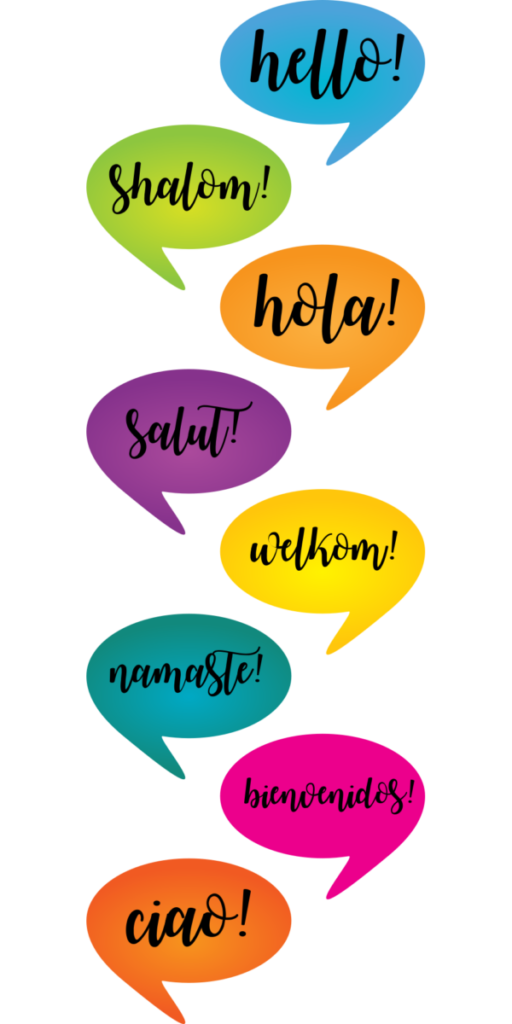
Take a look around, slick on the menu tabs, see what’s where. You can’t break this thing — trust me, I’ve tried. We did have a malware problem this summer, but it all seems to be fine now, so here we go!
Our first class meeting is Monday, August 29 at 2:00. Here’s the Zoom link: https://us02web.zoom.us/j/82794378077?pwd=Y3ZHVGwwRXY3RXNkaGhIZUNpekowUT09
Meeting ID: 827 9437 8077 Passcode: 128316
And don’t panic if this all seems like a lot!
It is. But we’ll get there together.
See you August 29th!



